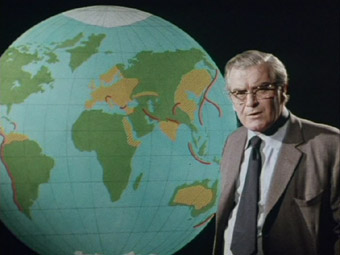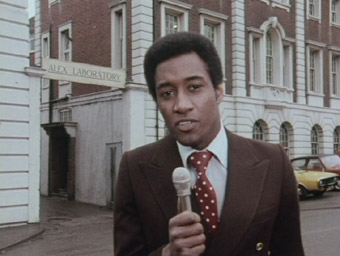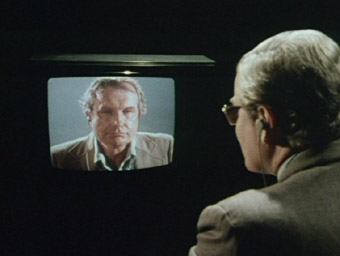|
I
can't remember when I first heard the word Mockumentary
coined, but I'm willing to bet it was following the release
of Rob Reiner's This is Spinal Tap. The
word itself suggests a comic mocking of documentary codes
and conventions, something Reiner's film did with hilarious
aplomb, and in the years that followed the term has expanded
to include just about every type of faux documentary, no
matter how serious its tone. This has resulted in two categories
of mockumentary, those which employ documentary conventions
for comic effect and those that use them to deliberately
trick the viewer into believing that a fictional story is
true.
One
of the first and most famous examples of the latter category
was broadcast on 1st April 1957, when the BBC's current affairs
programme Panorama included a report on
the annual spaghetti tree harvest in Switzerland. That the
public believed the story may seem absurd now, but back
in 1957 TV was a prime source of factual information,
and the very idea that a mainstream current affairs programme
would deliberately lie to its audience was almost unthinkable.
It's all about that bond of trust that exists between us
and the programme makers – even now if a newsreader slipped
a fake article in amongst the real stories, no matter how
far fetched, your natural inclination would be to take it
as fact.

It
was a similar story when Anglia Television broadcast an investigative documentary
as part of their Science Report series entitled Alternative 3 back in 1977, a programme
that drew some alarming conclusions from its investigation
into the disappearance of a number of scientists. Audiences
once again took the bait, though it helped that the broadcast
was postponed from its original transmission date of April
1st and that public concern over the greenhouse effect,
which figures prominently, was high. And come on, these
guys had never lied to us before...
It's
easy in retrospect to appreciate how the audience were
hoodwinked by Alternative 3. Technically it's often on the nose,
employing all of the techniques of investigative TV reporting to sell
its story as fact. Captioned interviews with experts are
alternated with more urgent handheld witness-chasing and hidden camera footage, supplemented by newspaper
headlines and photographs, animated diagrams, and real news
footage from around the world, plus an interview with ex-astronaut
Bob Grodin shot on grainy 8mm film by a reporter posing
as a tourist. There are even some rather well faked conversations
between astronauts and mission control, complete with end-of-line
beeps and appropriate distortion. Best of all, the whole
thing is soberly presented by real-life newscaster Tim Brinton as if he was convinced of
the truth of every word.
But
right from the start the telltale signs of a hoax are visible.
This is most obviously in the interview material, which almost always
feels performed in that way that actors playing street interviewees
can't seem to shake off (Equity union
rules of the time prevented the use of non-actors or real
experts willing to participate in the joke, whose unrehearsed
naturalism might have completely sold it). This is particularly
evident in the supposedly secret footage of young American
informant Harry, which plays a bit too much like carefully
rehearsed drama, though the subsequent hand-held footage
of the crew invading Harry's lodgings and coming under assault
works rather well.
The film takes a risk by falsely suggesting that Bob Grodin
was Neil Armstrong's companion on the first moon landing,
but in these pre-internet days I distinctly remember how
effectively Armstrong's name eclipsed even those of his
crewmates in the eyes of the general public –
I'd even go as far as to suggest that Buzz Aldrin's more
widespread recognition nowadays is partly the result of
his memorable appearance in the Deep Space Homer
episode of The Simpsons ("Second comes
right after first!"). The casting of an American actor
in the role rather than a Brit with a fake accent is certainly a big
plus, but time has again worked to expose the prank, with
the face of Shane Rimmer far more widely recognised than
it was at a time when his most widely known acting turn was as the voice of Scott Tracy in Thunderbirds.

What
does surprise in retrospect is that anyone remained
fooled once the closing credits rolled, given that they
announce the originally intended transmission date and list
all of the characters and the actors who played them, although
this is no doubt an indication of just how much notice many
viewers take of end credit sequences. But there's also a clue
at the very start, a semi-comic play on that non-specific
reporter speak that you could almost miss if you were not
paying attention. Standing on a balcony at Heathrow Airport,
Brinton tells us in all seriousness that this story came
to light when they were working on another film about Britain's
brain drain:
"That
film was never completed, because our enquiries led us
into some strange and unexpected byways, and they, in
their turn, led uniformly to a blank wall. A blank wall
below where I'm standing now, at the car park of Terminal
3 of London's Heathrow Airport."
It's
interesting to note just how much of the faked content now
seems weirdly on the money, from the use something called
a Space Shuttle to transport men and machinery into orbit
to the dire predictions of climate change and a possible
upcoming ice age. Some sources even claim that the reason
for the film's subsequent disappearance was precisely that
it was believed to have included information that was not
for public ears, something you can take with a small
pinch of salt.
It seems unlikely that anyone approaching Alternative
3 nowadays would not see through the scam, but
knowing it's a con lets you in on the fun, and there's
considerable enjoyment to be had from watching ingenious
pranksters plying their trade. Largely unseen in Britain since that
first TV screening, it was the film that most influenced
New Zealand filmmakers Peter Jackson and Costa Botes when
they made their own mockumentary delight, Forgotten
Silver.
Alternative
3 was shot on 16mm and has that slightly fuzzy,
grainy look that was common to TV film footage of the period.
That aside, the contrast is generally rather good and the
black levels solid – there's a fair amount of dust still
present, but it does intermittently recede. The quality
of the borrowed footage varies quite a bit, but this works
for the show's chosen style.

The
Dolby 2.0 mono soundtrack is clean of hiss and pops and
the dialogue and music and clear enough, with only a small
amount of distortion with some voices.
The Making of Alternative 3 (33:15)
Three of the key names behind Alternative 3 – writer David Ambrose, director Christopher Miles and presenter Tim Brinton – sit down in Brinton's living room to look back at the making of the film, the public reaction to it and the uncanny accuracy of its predictions (the similarity of their fictional scares to the very real ones outlined in An Inconvenient Truth is particularly highlighted). There are also a few engaging anecdotes, not least Ambrose's fateful coincidence-strewn encounter with a Japanese film crew.
Stills
5 large, high quality production stills.
Press Cuttings Gallery (29:39)
An extensive rolling gallery of press clippings from the time, which the camera drifts over to allow you to read each and every one. Included are stories on the controversy and appreciations of its technical handling, plus some articles printed in advance of the screening to prime audiences. There's even a newspaper cartoon lampooning the belief that it was all true.
Trailer Reel
Trailers for Allegro (2:19), Old Joy (2:20) and Wild Blue Yonder (1:57).
An
enjoyable TV prank whose appeal lies in its technique and
a hindsight ability to differentiate the plausible from
the bare-faced lies. In my first draft of this review I was hesitant about recommending a disc I hadn't seen the extra features for, but now that I've caught up with them I'd say it's definitely one to check out, with the discussion and press clippings providing some enjoayble and educational background information. For mockumentary fans it's a must, and if you enjoyed Forgotten Silver then
at long last you can see the film that was its inspiration.
|